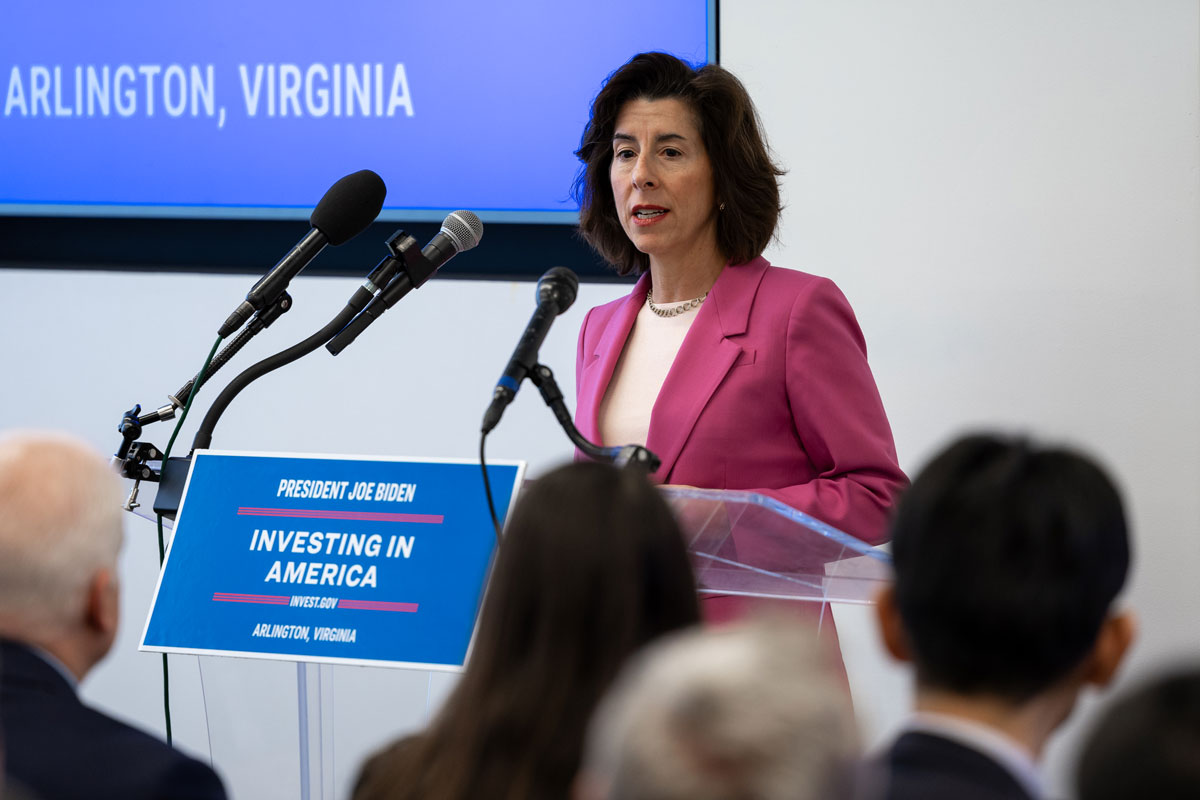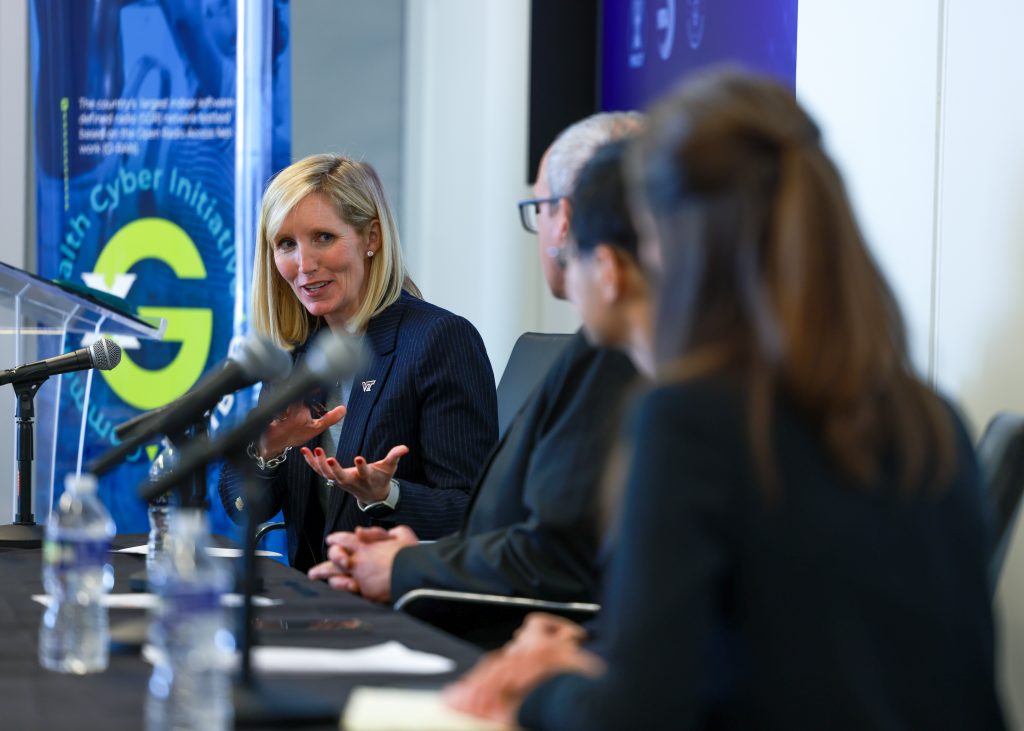CCI Soars with CHIPS Act Grants

The Commonwealth Cyber Initiative (CCI) has become a key contributor to the Wireless Innovation Fund managed by the National Telecommunications and Information Administration (NTIA). The CCI xG Testbed is an integral part of the initiative’s wireless innovation strategy, and a unique platform for testing and experimentation with the interoperability and security of open networks.
NTIA, a division of the U.S. Department of Commerce, funds projects through the Public Wireless Supply Chain Innovation Fund, with resources provided by the CHIPS and Science Act.
CCI researchers are involved in a total of six projects funded under the Innovation Fund’s first call for proposals through grants to develop and ensure the security of Open Radio Access Networks (O-RAN). These projects focus on:
- Promoting 5G (and beyond) technologies that are secure and open.
- Advancing ORAN-compliant networks that are better, faster, cheaper, and more secure.
- Supporting the integration of networks with equipment from multiple vendors.
- Identifying criteria to test for interoperability and compliance to open standards.
“CCI made an early strategic decision to invest in O-RAN, which has positioned us with unique strengths to contribute to the Wireless Innovation Fund objectives,” said Luiz DaSilva, CCI executive director and Bradley Professor of Cybersecurity at Virginia Tech.
“When we talk about the CCI xG Testbed, the tangible part, such as the equipment, is the first thing that comes to mind, but a major source of our strength also lies in the expertise we developed and the researchers we have trained. The workforce, and the ability to constantly train new professionals, is a major asset.”
CCI and NTIA Projects

CCI researchers and programs receiving grants include:
CCI, Virginia Tech part of $42 million wireless innovation project

The Commonwealth Cyber Initiative (CCI) and Virginia Tech will play an instrumental role in a $42 million wireless innovation project.
At the announcement event, U.S. Secretary of Commerce Gina Raimondo, Assistant Secretary of Commerce for Communications and Information Alan Davidson, U.S. Sen. Mark Warner of Virginia, U.S. Rep. Don Beyer of Virginia, and industry leaders discussed Open Radio Access Networks (O-RAN), which can boost competition, spur innovation, and create jobs.
“When the United States thinks about how … (we’ll) meet the greatest challenges of the day, we fall back on core American values – openness, competition, innovation, and working with our allies,” Raimondo said. “That’s what O-RAN is about. We want to lead the world and outcompete the world, and to do that, we have to out-innovate the world.”
Read more about the $42 million wireless innovation project.
To protect the nation, Virginia must remain an innovation leader: Op-ed by CCI Executive Director Luiz DaSilva

Today’s international conflicts are fought on many fronts, and one of them relates to the mobile phones that we use every day.
Operators such as AT&T, Verizon and T-Mobile rely on network equipment provided by a handful of telecommunications vendors. The commonwealth’s investment in cybersecurity innovation, research and workforce development has placed Virginia at the forefront of the United States’ efforts to drive innovation in this market.
Through recent decades, China has pursued leadership in wireless networks, becoming a dominant force in the standardization of cellular technologies. China-based Huawei currently has the highest market share among telecom equipment vendors and Chinese companies’ dominance is being particularly felt in emerging economies, where they compete aggressively on price.
Why does that matter? For one, there is the issue of the United States’ economic strength and competitiveness. At an event recently hosted at Virginia Tech, U.S. Secretary of Commerce Gina Raimondo said, “We want to lead the world and outcompete the world, and to do that we have to out-innovate the world.” It is in our interest to promote greater innovation and competition in the wireless market.
Read the editorial on the CCI site; read the editorial on the Richmond Times Dispatch site (paywall).
O-RAN Development and Security


Virginia Tech researchers Nishith Tripathi and Lingjia Liu each received $2 million awards from the Innovation Fund to develop the future of O-RAN technology.
Tripathi plans to tackle making O-RAN more secure in his project, Holistic Cybersecurity Testing Framework for 5G Open Radio Access Networks. The project will develop multiple testing methods for 5G O-RAN, each with a different focus on vulnerabilities, bugs or attacks.
One of Tripathi's collabarators on the project will be Vijay Shah, of George Mason University.
Liu plans to develop an intelligent testing framework under his grant project, Learning-Based O-RAN Testing. Liu and his team will develop efficient and accurate tests for cellular vendors looking to leverage O-RAN for faster, better, wireless operations.
Read more about Tripathi and Liu and their projects.
Wireless Network Development

The Public Wireless Supply Chain Innovation Fund showcased two funded projects to researchers from Virginia Tech, the Commonwealth Cyber Initiative (CCI), and Booz Allen Hamilton.
“What we're focused on is leveraging that billion and a half dollars that we have to provide to the ecosystem so that we can really drive that innovation and hopefully drive the U.S. ecosystem to try and regain leadership [in wireless networks] and create supply chain diversity,” said Amanda Toman, director of the NTIA’s Public Wireless Supply Chain Innovation Fund.
Industry and academia collaborations such as the newly funded projects with Virginia Tech, CCI, and Booz Allen are examples of partnerships that will tackle challenges and move O-RAN to commercial adoption.
Read more about the wireless network security projects program.
O-RAN and Artificial Intelligence


Two George Mason College of Engineering and Computing faculty members are part of a project awarded $1.7 million by the NTIA’s Public Wireless Supply Chain Innovation Fund.
Kai Zeng, a professor in the Electrical and Computer Engineering Department, and Vijay K. Shah, an assistant professor in the Cybersecurity Engineering Department, are part of a team led by researchers from Michigan State University to test O-RAN components using artificial intelligence (AI).
Zeng, Shah, and their colleagues will use AI to guide the process of running hundreds of millions of test cases within complex O-RAN systems. “We can accelerate the testing process and make it automatic [with AI],” said Zeng.


